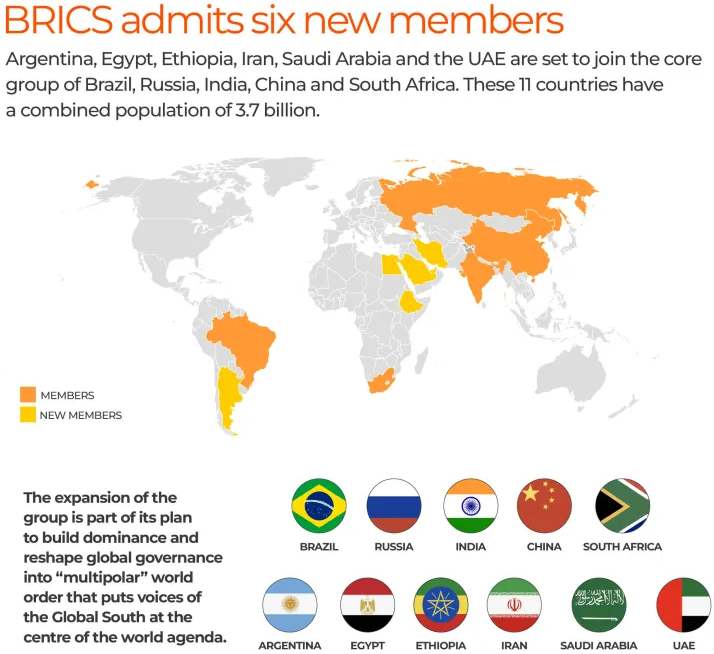
From Aug. 22 to 24, the 15th BRICS Summit took place in Johannesburg, South Africa. A significant consensus reached at the meeting was the invitation to Argentina, Egypt, Ethiopia, Iran, Saudi Arabia and the United Arab Emirates to participate in the BRICS cooperation mechanism. The emergence and development of the mechanism are not only the outcome of profound changes in the international political and economic landscape but act as a critical catalyst for enhancing and refining global governance.
Since the inception of BRICS cooperation by four foreign ministers in 2006, the mechanism has seen substantial progress, exhibiting potent developmental momentum. This signifies that BRICS countries share a similar global vision, mutual development objectives and a robust inclination to cooperate.
In terms of global vision, BRICS countries perceive the world as transitioning toward multipolarity and advocate for the democratization of international relations. They are dedicated to amplifying the role and contribution of emerging and developing countries in global governance. The inherent meaning of multipolarity advocated by BRICS countries is found in their opposition to any form of hegemonism or power politics. This stance should not be misconstrued as anti-American or anti-Western.
Regarding development objectives, the principal aspiration of BRICS countries is to achieve modernization. Autonomous choice of development path is a common feature of these countries in advancing their modernization processes. From a broader strategic viewpoint, modernization necessitates strong leadership, effective and efficient decision-making and robust and comprehensive national governance mechanisms.
China and other BRICS countries share many similarities in fostering sustainable economic development, advocating for social fairness and justice, safeguarding the welfare of citizens and maintaining social and political stability. Consequently, enhancing exchanges in governance has become a crucial method for BRICS countries to foster cooperation and pursue modernization.
At the same time, in the process of achieving modernization, BRICS countries emphasize the necessity to respect each other’s choice of development path, which is also a significant experience in BRICS cooperation.
Concerning the willingness to cooperate, BRICS countries value the role of the mechanism and perceive it as a significant platform for exerting international influence and exchanging experience in governance.
China has actively participated in the conceptual development, formation, and growth of BRICS and has played a pivotal role. In the new era, China regards the BRICS mechanism as a diplomatic conduit for engaging with other developing countries and an avenue to strengthen South-South cooperation. Moreover, China perceives this mechanism as a stage for implementing multilateral diplomatic strategies and as an instrument for catalyzing the democratization of the international order and relationships.
As a crucial platform for improving global governance, the BRICS mechanism, with its ongoing process of refinement and evolution, is poised to play an increasingly proactive role in promoting a more equitable and just international governance system.
First, BRICS countries are ascending as an indispensable force in global governance, demonstrating an increasing influence in global politics and economics. Following the expansion, the BRICS countries’ proportion of the world’s total land area has risen from 26 percent to 32 percent; population from 42 percent to 47 percent; GDP from 26 percent to 29 percent; and total merchandise trade from 18 percent to 21 percent.
Second, the representativeness of the BRICS countries mirrors the international community’s aspiration for more equitable and fair global governance reforms. Of the 193 member states of the United Nations, a majority are developing countries (approximately 130 to 140). Developing countries constitute over 80 percent of the world’s total population and contribute more than 70 percent of global economic growth. Nevertheless, under the current global governance system, developing countries face considerable underrepresentation and lack a meaningful voice.
BRICS countries, as representatives of emerging markets, are responding to the needs of developing countries by enhancing their status and role in the global governance system. This addresses the core issues of an unbalanced global governance structure and insufficient governance capacity.
The BRICS cooperation mechanism has evolved into a significant platform for promoting South-South cooperation and a crucial bridge for North-South cooperation. Hence, the mechanism has attained broad recognition from the international community, especially from developing countries.
Third, BRICS countries adhere to an open and inclusive cooperation philosophy, prioritizing communication and cooperation with existing international multilateral mechanisms. Their position and role in multilateral mechanisms such as the United Nations, G20, World Bank and International Monetary Fund have been progressively enhanced, making them an essential component of the existing global governance system.
Last, BRICS countries uphold the spirit of mutual respect and understanding, equality, solidarity, openness, inclusiveness and consensus. This spirit corresponds with the needs of mainstream international public opinion and the direction of development in the current era. It is therefore earning increasing international recognition.
In conclusion, the BRICS countries share similar or common perspectives, objectives and requirements concerning the evolution of the international landscape, reform of the global governance system and national modernization. They are playing an increasingly vital role in international affairs and have become an integral part of existing international multilateral mechanisms.
Looking ahead, BRICS countries can and should support and coordinate with each other in promoting their respective national development agendas and exerting international influence. They can learn from each other’s experiences and contribute significantly as emerging markets and developing countries to the construction a peaceful, secure, prosperous, fair and beautiful world, while working to achieve their respective national development goals.
